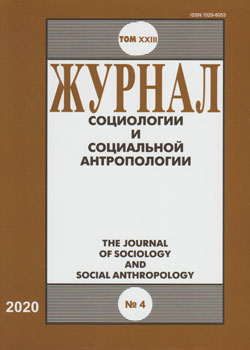Поколение «Дельта»: в поисках характеристик российского поколения настоящего-будущего
Аннотация
Литература
Bantserova O.L., Azarenkov V.P. (2018) Problemy formirovaniya arhitektruno-prostranstvennoj sredy detskih tekhnoparkov [Problems of forming the architectural and spatial environment of children's technoparks]. Perspektivy nauki [Perspectives of science], 11(110): 46–50 (in Russian).
Beschasnaya A.A. (2007) Problema vozrastnoj periodizacii v sociologii detstva [The problem of age periodization in the sociology of childhood]. Izvestiya Rossiyskogo gosudarstvennogo pedagogicheskogo universiteta im. A.I. Herzen [Herzen University Journal of Humanities & Sciences], 8(41): 151–157 (in Russian).
Bocharov V.V. (2000) Antropologiya vozrasta [Anthropology of age]. St. Petersburg: Publishing House of St. Petersburg State University (in Russian).
Bochaver A.A., Zhilinskaya A.V., Khlomov K.D. (2016) Perspektivy sovremennyh podrostkov v kontekste zhiznennoj traektorii [Perspectives of modern teenagers in the context of life trajectory]. Sovremennaya zarubezhnaya psihologiya [Modern foreign psychology], 5(2): 31–38 (in Russian).
Bourdieu P. (2005) Social'noe prostranstvo: polya i praktiki [Social space: fields and practices]. St. Petersburg: Aleteya; Moscow: Institute of Experimental Sociology (in Russian).
Csob?nka Zs.E. (2016) The Z generation. Acta Technologica Dubnicae, 7(2): 63–76.
Dzhurinsky A.N. (2004) Istoriya obrazovaniya i pedagogicheskoj mysli [History of education and pedagogical thought]. Moscow: Vlados (in Russian).
Egorova M.S., Zyryanova N.M., Pyankova S.D., Chertkov Y.D. (2001) Iz zhizni lyudej doshkol'nogo vozrasta. Deti v izmenyayushchemsya mire [From the life of people of preschool age. Children in a changing world]. St. Petersburg: Aleteya (in Russian).
Gorbachev N.P., Tsirikhova A.E. (2018) Vliyanie interneta na podrostkovye suicidy [The Impact of the Internet on adolescent suicides]. In: Musarsky M.M. (ed.) Homo instagramus: chelovek v cifrovom obshchestve materialy mezhvuzovskoj studencheskoj nauchno-prakticheskoj konferencii [Homo instagram: a person in a digital society materials of the interuniversity student scientific and practical conference]. Moscow: MGPU: 158–162 (in Russian).
Kon I.S. (2006) Mezhdisciplinarnye issledovaniya. Sociologiya. Psihologiya. Seksologiya. Antropologiya [Interdisciplinary research. Sociology. Psychology. Sexology. Anthropology]. Rostov-nа-Donu: Phoenix (in Russian).
Lebed O.L. (2009) Social'nye posledstviya depopulyacii v Rossii [Social consequences of depopulation in Russia]. In: Antonov A.I. (ed.) Demograficheskie issledovaniya: sbornik [Demographic research: collection]. Moscow: KDU: 137–147 (in Russian).
Levada Y.A. (2005) Pokoleniya XX veka: vozmozhnosti issledovaniya [Generations of the twentieth century: research opportunities]. In: Levada Y., Shanin T. (eds.) Otcy i deti: pokolencheskij analiz sovremennoj Rossii [Fathers and children: generational analysis of modern Russia]. Moscow: NLO: 41–44 (in Russian).
Lisauskene M.V. (2019) Molodye sibiryaki: zhiznennye cennosti i modeli povedeniya «pokoleniya Z» (opyt issledovanij molodezhi Irkutskoj oblasti v 1991, 2013, 2018 gg.) [Younger Siberians: life values and behavior models of the generation Z (studies of Irkutsk Region in 1991, 2013, and 2018)]. Siberian Sotsium, 3(1): 46–60 (in Russian).
Lukov V.A. (2012) Teorii molodezhi: Mezhdisciplinarnyj analiz [Theories of youth: Interdisciplinary analysis]. Moscow: Canon+ (in Russian).
Mannheim K. (2000) Ocherki sociologii znaniya. Problema pokolenij — sostyazatel'nost' — ekonomicheskie ambicii [Essays on the sociology of knowledge. The problem of generations, competitiveness and economic ambitions]. Moscow: INION RAN (in Russian).
Mayorova-Shcheglova S.N. (2007) Detstvo v nachale XXI veka: paradoksy razvitiya i funkcionirovaniya [Childhood at the beginning of the XXI century: paradoxes of development and functioning]. Vestnik RGGU. Seriya: Filosofiya. Sociologiya. Iskusstvovedenie [Bulletin of RSUH. Series: Philosophy. Sociology. Art history], 2–3: 191–201 (in Russian).
McCrindle M., Wolfinger E. (2016) The ABC of XYZ: Understanding the Global Generations [https://2qean3b1jjd1s87812ool5ji-wpengine.netdna-ssl.com/wp-content/uplo... ] (accessed: 25.01.2020).
Nagy A., K?lcsey A. (2017) Acta Generation Alpha: Marketing or Science? Acta Technologica Dubnicae, 7(1): 107–115.
Ortega у Gasset J. (2000) Vosstanie mass. In: Ortega y Gasset J. Selected Works. Moscow: Ves’ Mir (in Russian).
Radaev V.V. (2018) Millenialy na fone predshestvuyushchih pokolenij: empiricheskij analiz [Millennials compared to previous generations: an empirical analysis]. Sotsiologicheskiye issledovaniya [Sociological research], 3: 15–33 (in Russian).
Rybakovsky O.L., Tayunova O.A. (2017) Rozhdaemost' naseleniya Rossii i demograficheskie volny [Birth rate of the Russian population and demographic waves]. Narodonaselenie [Population], 4(78): 56–66 (in Russian).
Saldan I.P., Filippova S.P., Zhukova O.V., Shved O.I., Pashkov A.P., Tseluev N.Yu., Shultz K.V., Nagornyak A.S. (2019) Sovremennye tendencii v izmeneniyah pokazatelej fizicheskogo razvitiya detej i podrostkov (obzornaya stat'ya) [Current trends in changes in indicators of physical development of children and adolescents (review article)]. Byulleten meditsinskoy nauki [Bulletin of medical science], 1 (13): 14–20 (in Russian).
Salenko A.V. (2019) Svoboda mirnyh sobranij: «detskie mitingi» i «vzroslye sankcii» [Freedom of peaceful Assembly: “children's rallies” and “adult sanctions”]. Zhurnal rossiyskogo prava [Journal of Russian law], 8: 48–61 (in Russian).
Scholz C., Rennig A. (eds.) (2019) Generations Z in Europe (The Changing Context of Managing People). Bingley: Emerald Publishing Limited: 285–299.
Semenova V.V. (2005) Sovremennye koncepcii i empiricheskie podhody k ponyatiyu «pokolenie» v sociologii [Modern concepts and empirical approaches to the concept of “generation” in sociology]. In: Levada Y., Shanin T. (ed.) Otcy i deti: pokolencheskij analiz sovremennoj Rossii [Fathers and children: generational analysis of modern Russia]. Moscow: NLO, 2005: 80–107 (in Russian).
Shanin T. (2005) Istoriya pokolenij i pokolencheskaya istoriya [The history of generations and generational history]. In: LevadaYu., ShaninT. (ed.) Otcy i deti: pokolencheskij analiz sovremennoj Rossii [Fathers and children: generational analysis of modern Russia]. Moscow: NLO: 17–38 (in Russian).
Sharon A.D. (2015) Understanding the Millennial Generation. Journal of Financial Service Professionals, 69(6): 11–14.
Shvab K. (2018) Chetvertaya promyshlennaya revolyuciya [The Fourth industrial revolution]. Moscow: Eksmo (in Russian).
Stillman D. (2018) Pokolenie Z na rabote. Kak ego ponyat' i najti obshchij yazyk [Generation Z at work. How to understand it and find a common language]. Moscow: Mann, Ivanov and Ferber (in Russian).
Tari A. (2011) Z gener?ci?. Budapest: Jaffa Kiad?.
Tsareva A.V. (2012) Chelovek v seti: smena veb-pokolenij [Human being in the net: the change of web generations]. Zhurnal sotsiologii i sotsialnoy antropologii (The Journal of Sociology and Social Anthropology), XV (5): 36–54 (in Russian).
Urlanis B.S. (1985) Izbrannoe [Selected]. Moscow: Mysl’ (in Russian).
Vyugina D. (2019) Generation z in Russia: The digital divide of the generation Putin. In: Scholz C., Rennig A. (ed.) Generations Z in Europe (The Changing Context of Managing People). Bingley: Emerald Publishing Limited: 253–274.






